The Road
MY DEPARTURE FROM TELEVISION WRITING meant that I was now adrift. I had lost my financial support and my hyphen and now was only a comedian. A club owner in Denver, Chet Hansen, started up a small agency, and even though comedy clubs did not exist yet, he somehow produced wide-ranging bookings that involved planes, trains, and automobiles. For the next few years, I was on the road with an itinerary designed by the Marquis de Sade. But there was a sexy anonymity about the travel; I was living the folkie myth of having no ties to anyone, working small clubs and colleges in improvised folk rooms that were usually subterranean. However, the travel isolated me. Friends were available only through costly phone calls, and contact with my parents and sister spiraled down to a pinpoint.
In this netherworld, I was free to experiment. These out-of-the-way and varied places provided a tough comedy education. There were no mentors to tell me what to do; there were no guidebooks for doing stand-up. Everything was learned in practice, and the lonely road, with no critical eyes watching, was the place to dig up my boldest, or dumbest, ideas and put them onstage. At night, preoccupied by the success or failure of that evening’s show, I would return to my motel room and glumly watch the three TV channels sign off the air at eleven-thirty, knowing I had at least two more hours of ceiling staring to do before the adrenaline eased off and I could fall asleep.
While I toured around the country, Bill had found a Los Angeles agent whom we both adored: Marty Klein. Marty, who loved gold cigarette lighters, fancy eyeglasses, and quality suits, made sure I saw the old-time world of show business before it was gone, taking me to the Brown Derby restaurant in Hollywood, where the walls were lined with celebrity caricatures from the thirties and forties, and the Sands Hotel in Vegas, where the Rat Pack had cavorted. Bill was also promoting my name to record companies. A recording contract was our quest, though I secretly worried about a record’s potential, as my act was becoming more and more visual. “And now,” I would announce, “my impression of the Incredible Shrinking Man!” I would ask the audience to close their eyes for a moment, and when they reopened them, I had raised the microphone several feet. Another bit: I would wonder what it would be like if the human body had only one arm right in the center of our chest. How would we applaud? Putting my elbow in the center of my torso, I would then slap myself in the face a dozen times.
I took on an excellent roadie, Maple Byrne, whom I met at a defunct recording studio where he lived in the echo chamber. He was a real Deadhead who had to vanish now and then to see a Grateful Dead concert. He booked my travel, set up the props, checked the sound, and ran the lights. Despite his presence, on the road I was fundamentally a loner, withdrawn and solitary, and his introduction of mournful Irish folk music into my life didn’t help my mood. We would drive at night from job to job, listening to cassette tapes of the Bothy Band. Sad, lonely songs for the sad, lonely road. One of the tunes, “The Maid of Coolmore,” inspired a film I wrote twelve years later, L.A. Story.
When necessary, I could still manage to have a personality, and sometimes I was rescued by a local girl who actually liked me. Occasionally the result was an erotic tryst enhanced by loneliness. Perhaps the women saw it as I did, an encounter free from obligation: the next day I would be gone. I had also refined my pickup technique. If I knew I would be returning to a club, I tweaked my hard-learned rule, “Never hit on a waitress the first night,” to “Never hit on a waitress for six months.” I came off as coolly reserved, as I would harmlessly flirt on my first visit; by my next visit, everything was in place. Soon the six months caught up with me, and I always had someone I could latch on to as I rolled from town to town.
I did have interludes of monogamy with a few women. Iris C. was an aspiring actress who, coincidentally, lived next door, which cut down on travel time for sudden sleepover urges. Chris Gooch, a fragile, ethereal blonde, seemed to float into the club I was playing, the Vanguard, in Kansas City, Missouri. We lived together in Los Angeles for a while. Sandee Oliver—her last name described the color of her skin—lived in Atlanta, and we rendezvoused in towns across America. Were they beautiful? We were all beautiful. We were in our twenties.
I alternated obscure appearances across America with higher-profile opening-act jobs at the Boarding House in San Francisco, the Troubadour in Los Angeles, and the Great Southeast Music Hall in Atlanta, where I first performed with the singer/comedian Martin Mull. Martin’s wit was Sahara-dry; he performed onstage sitting on living room furniture and sang his own comic songs, with titles like “Noses Run in My Family,” “I’m Everyone I Ever Loved,” “(How Could I Not Miss) A Girl Your Size,” and “Jesus Christ, Football Star.” On opening night at the Great Southeast Music Hall, we were both nervous about meeting each other. I was sitting in my open dressing room when Martin walked by, carrying his stage clothes on a hanger. Unsure whether to say something to me, he kept going. After a few steps, I called out, “Nice meeting you, too.” We’ve been friends ever since.
Martin suggested me to his recording label, Capricorn Records. The response from the producer, Phil Walden, was “Too visual; he’s too visual.” Later, after my first record shipped platinum (meaning it had already sold a million before it was released), Phil called up Martin: “Hey, Mull, you know any more of those visual guys?”
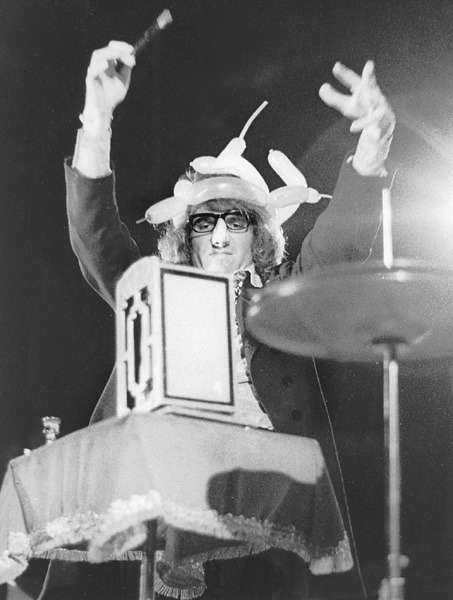
Yes, I suppose I was visual.
In Los Angeles, the Troubadour was my hangout, and the girls did indeed get prettier as closing time neared, or maybe it was I who got prettier to them. The Troubadour’s regulars included Michael Nesmith, Jackson Browne, Joni Mitchell, Glenn Frey, Don Henley, and all the others whose music was a siren call to a perceptive record executive named David Geffen. One week I opened the show for Linda Ronstadt; she sang barefoot on a raised stage and wore a silver lamé dress that stopped a millimeter below her panties, causing the floor of the Troubadour to be slick with drool. Linda and I saw each other for a while, but I was so intimidated by her talent and street smarts that, after the ninth date, she finally said, “Steve, do you often date girls and not try to sleep with them?” We parted chaste.
One late night I was lingering in the bar and talking to Glenn Frey, who was just leaving his duo, Longbranch Pennywhistle. He said he was considering a name for his new five-man group. “What is it?” I said. He said, “Eagles.” I said, “You mean, the Eagles.” He said, “No, Eagles.” I said, “You mean, the Eagles?” He said, “No, I mean Eagles.” The name of the group remains, of course, Eagles.
Mixed reviews continued. At the end of my closing-night show at the Troubadour, I stood onstage and took out five bananas. I peeled them, put one on my head, one in each pocket, and squeezed one in each hand. Then I read the last line of my latest bad review: “Sharing the bill with Poco this week is comedian Steve Martin…his twenty-five-minute routine failed to establish any comic identity that would make the audience remember him or the material.” Then I walked off the stage.
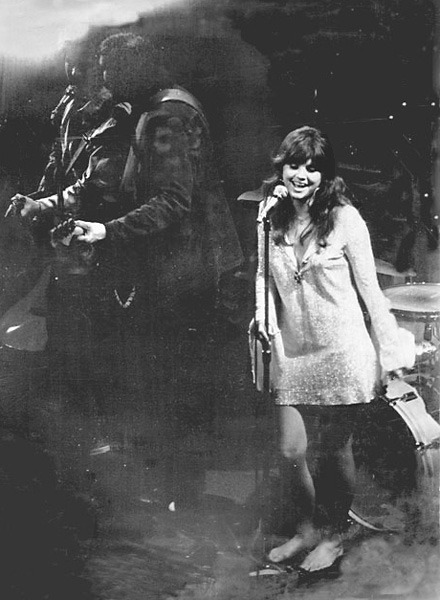
Linda onstage at the Troubadour.
IN CASE I AD-LIBBED something wonderful, I began taping my shows with a chintzy cassette recorder. I had a routine in which I played a smug party guy with a drink in his hand. When the bit started, the waitresses brought me a glass of wine that I would use as a prop. When that glass was empty, they would bring me another. One night I listened to the tape and could hear myself slurring. I never had a drink before or during a show again.
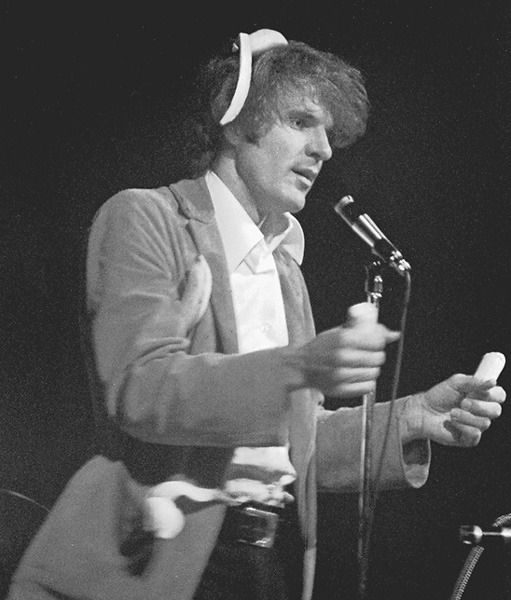
The Troubadour, 1968.
I made another correction based on the tapes. Texas-born and California-raised, I realized I was dropping my “ings”—runnin’, walkin’, and talkin’—and I worked like Eliza Doolittle to elevate my speech. It was a struggle; at first I thought I sounded pretentious and unnatural. But I did it, though now and then I slip back into my natural way of speakin’.
THE CONSISTENT WORK enhanced my act. I learned a lesson: It was easy to be great. Every entertainer has a night when everything is clicking. These nights are accidental and statistical: Like lucky cards in poker, you can count on them occurring over time. What was hard was to be good, consistently good, night after night, no matter what the abominable circumstances. Performing in so many varied situations made every predicament manageable, from Toronto, where I performed next to an active salad bar, to the well-paying but soul-killing Playboy Clubs, where I was almost but not quite able to go over. But as I continued to work, my material grew; I came up with odd little gags such as “How many people have never raised their hands before?” I was now capable of doing two different twenty-five-minute sets per evening, in case some of the audience stayed over for the second show.
Because I was generally unknown, in the smaller venues I was free to gamble with material, and there were a few evenings when crucial mutations affected my developing act. At Vanderbilt University in Nashville, I played for approximately a hundred students in a classroom with a stage at one end. I did the show, and it went fine. However, when it was over, something odd happened. The audience didn’t leave. The stage had no wings, no place for me to go, but I still had to pack up my props. I indicated that the show had ended, but they just sat there, even after I said flatly, “It’s over.” They thought this was all part of the act, and I couldn’t convince them otherwise. Then I realized there were no exits from the stage and that the only way out was to go through the audience. So I kept talking. I passed among them, ad-libbing comments along the way. I walked out into the hallway, trying to finish the show, but they followed me there, too. A reluctant pied piper, I went outside onto the campus, and they stayed right behind me. I came across a drained swimming pool. I asked the audience to get into it—“Everybody into the pool!”—and they did. Then I said I was going to swim across the top of them, and the crowd knew exactly what to do: I was passed hand over hand as I did the crawl. That night I went to bed feeling I had entered new comic territory. My show was becoming something else, something free and unpredictable, and the doing of it thrilled me, because each new performance brought my view of comedy into sharper focus.
The act tightened. It became more physical. It was true I couldn’t sing or dance, but singing funny and dancing funny were another matter. All I had to do was free my mind and start. I would abruptly stop the show and sing loudly, in my best lounge-singer voice, “Grampa bought a rubber.” Walking up to the mike, I would say, “Here’s something you don’t often see,” and I’d spread my mouth wide with my fingers and leap into the air while screaming. Or, invoking a remembered phrase from the magic shop, I would shout, “Uh-oh, I’m getting happy feet!” and then dance uncontrollably across the stage, my feet moving like Balla’s painting of a futurist dog, while my face told the audience that I wanted to stop but couldn’t. Closing the show, I’d say, “I’d like to thank each and every one of you for coming here tonight.” Then I would walk into the audience and, in fast motion, thank everyone individually. My set lists, written on notepad paper and kept in my coat pocket, were becoming drenched with sweat.
The new physicality brought an unexpected element into the act: precision. My routines wove the verbal with the physical and I found pleasure trying to bring them in line. Each spoken idea had to be physically expressed as well. My teenage attempt at a magician’s grace was being transformed into an awkward comic grace. I felt as though every part of me was working. Some nights it seemed that it wasn’t the line that got the laugh, but the tip of my finger. I tried to make voice and posture as crucial as jokes and gags. Silence, too, brought forth laughs. Sometimes I would stop and, saying nothing, stare at the audience with a look of mock disdain, and on a good night, it struck us all as funny, as if we were in on the joke even though there was no actual joke we could point to. Finally, I understood the cummings quote I had puzzled over in college: “Like the burlesque comedian, I am abnormally fond of that precision which creates movement.” Precision was moving the plot forward, was filling every moment with content, was keeping the audience engaged.
The act was becoming simultaneously smart and stupid. My version of smart was to imbue a hint of conceptualism into the whole affair: My sing-along had some funny lyrics, but it was also impossible to sing along with. My version of stupid: “Oh, gosh! My shoelace is untied!” I would bend down, see that my shoelace was not untied, stand up, and say, “Oh, I love playing jokes on myself!”
I had the plumber joke, which was impossible to understand even for plumbers:
“Okay, I don’t like to gear my material to the audience, but I’d like to make an exception, because I was told that there is a convention of plumbers in town this week—I understand about thirty of them came down to the show tonight—so before I came out, I worked up a joke especially for the plumbers. Those of you who aren’t plumbers probably won’t get this and won’t think it’s funny, but I think those of you who are plumbers will really enjoy this.
“This lawn supervisor was out on a sprinkler maintenance job, and he started working on a Findlay sprinkler head with a Langstrom seven-inch gangly wrench. Just then this little apprentice leaned over and said, ‘You can’t work on a Findlay sprinkler head with a Langstrom seven-inch wrench.’ Well, this infuriated the supervisor, so he went and got volume fourteen of the Kinsley manual, and he reads to him and says, ‘The Langstrom seven-inch wrench can be used with the Findlay sprocket.’ Just then the little apprentice leaned over and says, ‘It says sprocket, not socket!’
[Worried pause.]
“Were these plumbers supposed to be here this show?”
One of my favorite bits to perform evolved at the Troubadour in Los Angeles. After I finished my act, I would go up to the sound booth, where there was an open mike out of sight of the audience, and say, “They can’t hear me out there, can they?” “No,” the coached soundman would reply. Then I would say, “What a bunch of assholes. Where can I get some pot?” I would continue my arrogant comments until the bit ran dry.
On the road, the daylight hours moved slowly, filled with aimless wandering through malls and museums. But at night, onstage, every second mattered. Every gesture mattered. The few hours I spent in the clubs and coffee-houses seemed like a full existence.
When I had new material to try, I would break it down into its smallest elements, literally a gesture or a few words, then sneak it into the act in its shortest form, being careful not to disrupt the flow of the show. If it worked, the next night I would add the next discreet packet until the bit either filled out or died. I can remember bailing out of a bit because I didn’t want to be trapped in it for the next five minutes. The easiest way was to pretend I’d gotten distracted by something and then completely change tack.
Around this time I smelled a rat. The rat was the Age of Aquarius. Though the era’s hairstyles, clothes, and lingo still dominated youth culture, by 1972 the movement was tired and breaking down. Drugs had killed people, and so had Charles Manson. The war in Vietnam was near its official end, but its devastating losses had embittered and divided America. The political scene was exhausting, and many people, including me, were alienated from government. Murders and beatings at campus protests weren’t going to be resolved by sticking a daisy into the pointy end of a rifle. Flower Power was waning, but no one wanted to believe it yet, because we had all invested so much of ourselves in its message. Change was imminent.
I cut my hair, shaved my beard, and put on a suit. I stripped the act of all political references, which I felt was an act of defiance. To politics I was saying, “I’ll get along without you very well. It’s time to be funny.” Overnight, I was no longer at the tail end of an old movement but at the front end of a new one. Instead of looking like another freak with a crazy act, I now looked like a visitor from the straight world who had gone seriously awry. The act’s unbridled nonsense was taking the audience—and me—on a wild ride, and my growing professionalism, founded on thousands of shows, created a subliminal sense of authority that made the audience feel they weren’t being had.
Between 1973 and 1975, my one-man vaudeville show turned fully toward the surreal. I was linking the unlinkable, blending economy and extravagance, non sequiturs with the conventional. I was all over the place, sluicing the gold from the dirt, honing the edge that confidence brings. I cannot say I was fearless, because I was acutely aware of any audience drift, and if I sensed trouble, I would swerve around it. I believed it was important to be funny now, while the audience was watching, but it was also important to be funny later, when the audience was home and thinking about it. I didn’t worry if a bit got no response, as long as I believed it had enough strangeness to linger. My friend Rick Moranis (whose imitation of Woody Allen was so precise that it made Woody seem like a faker) called my act’s final manifestation “anti-comedy.”
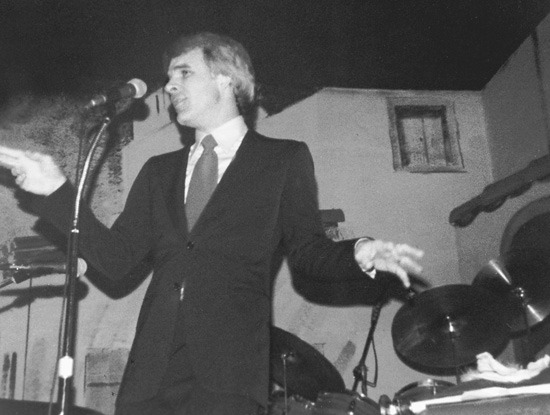
Cut my hair, put on a suit.
ONE WEEKEND I WAS PLAYING at the Boarding House in San Francisco, opening for a talented mountain-man folksinger named U. Utah Philips. My shows went well, very well. I waited for the reviews, but there was scant mention. Five paragraphs devoted to Utah, and a line or two about me. I noticed it in Los Angeles, too, at the Troubadour. Large thoughtful reviews of the headliner, little or nothing about the opening act. I was learning something about the audience and critics: They aren’t there to see the opener. The implied power of the headliner cannot be challenged by a pleasant opening act. But I was not a headliner; I had no following, and I was nearing my arbitrary thirty-year cutoff point. I was consistently appearing on TV shows, even The Tonight Show, but what filled folk clubs was underground word of mouth, usually generated by record sales, not late-night TV watchers. I decided to headline only, win or lose. This meant no more Boarding House, no more Troubadour. It meant that the size of the house I could play would drop significantly. I held firmly to this idea, and within the year, I was completely broke.
I called the comedian David Brenner for advice. David was successfully guest-hosting The Tonight Show and filling theaters and clubs. Our paths had crossed, and we had exchanged phone numbers. I explained that I was getting jobs, but the travel costs were killing me. If I got five hundred dollars for an appearance, it would cost me three hundred just to get to it. He told me the deal he always proposed to club owners. He would take the door, and they would take the bar. He said he would hire someone to stand at the entrance with a mechanical counter to make sure he wasn’t being cheated. I didn’t have the chutzpah to “audit” this way, but otherwise it seemed like a fair gambit. I wanted to either get in or get out of the business. I would be paid according to how many people I drew, and that satisfied my Protestant inclination to earn my keep.
I proposed this deal immediately to an amenable club owner—after all, he didn’t have to put any money up front—and in October 1973 I got a job at Bubbas in Coconut Grove, Florida, now vanished into the folkie sinkhole. It held about ninety people, seated in the worst configuration a club could have. Directly in front of the stage were seats for about ten; extending to the performer’s right were the other eighty seats. There was no depth at all, and most of the audience saw only a side view of the performer. These lopsided arrangements were never conducive to laughter because the audience couldn’t quite unite. I arrived a day early, in time to see the closing night of another performer, a comedian who, at least in the show I saw, lifted a line or two from Lenny Bruce. Doing other people’s material was on my taboo list, but he was a nice guy and still funny, and when we met after the show, he knew that I knew that he knew that I knew, but we ignored it.
The next night I opened, and business was slow. However, I was ready to put my experience at Vanderbilt into effect. The Florida night was balmy and I was able to take the audience outside into the street and roam around in front of the club, making wisecracks. I didn’t quite know how to end the show. First I started hitchhiking; a few cars passed me by. Then a taxi came by. I hailed it and got in. I went around the block, returned and waved at the audience—still standing there—then drove off and never came back. The next morning I received one of the most crucial reviews of my life. John Huddy, the respected entertainment critic for The Miami Herald, devoted his entire column to my act. Without qualification, he raved in paragraph after paragraph, starting with HE PARADES HIS HILARITY RIGHT OUT INTO THE STREET, and concluded with: “Steve Martin is the brightest, cleverest, wackiest new comedian around.” Oh, and the next night the club owner made sure all tabs had been paid before I took the audience outside.
Roger Smith had told me that when he came to Hollywood from El Paso to be an actor, he had given himself six months to get work. The time elapsed, and he packed up his car, which was parked on Sunset Boulevard, where his final audition would be. Informed that he was not right for the job, he went out and started up his car. He was about to pull away, away to El Paso, when there was a knock on his windshield. “We saw you in the hall. Would you like to read for us?” the voice said. He was then cast as the star of the hit television show 77 Sunset Strip. My review from John Huddy was the knock on the window just as I was about to get in my car and drive to a metaphorical El Paso, and it gave me a psychological boost that allowed me to nix my arbitrarily chosen thirty-year-old deadline to reenter the conventional world. The next night and the rest of the week the club was full, all ninety seats. Three thousand miles away, Bill McEuen took the review and waved it in the face of every record executive in Hollywood, with no bites.

The flyer at Bubbas. Steve Goodman played the week before me, and later he became a sensational opening act for my show.
I continued to appear on The Tonight Show, always with a guest host, doing material I was developing on the road. Then I got a surprise note from Bob Shayne: “We had a meeting with Johnny yesterday, told him you’d been a smash twice with guest hosts, and he agrees you should be back on with him. So I think that hurdle is over.” In September 1974 I was booked on the show with Johnny.
This was welcome news. Johnny had comic savvy. The daytime television hosts, with the exception of Steve Allen, did not come from comedy. I had a small routine (suggested by my writer friend Michael Elias) that went like this: “I just bought a new car. It’s a prestige car. A ’65 Greyhound bus. You know you can get up to thirty tons of luggage in one of those babies? I put a lot of money into it…. I put a new dog on the side. And if I said to a girl, ‘Do you want to get in the backseat?’ I had, like, forty chances.” Etc. Not great, but at the time it was working. It did, however, require all the pauses and nuance that I could muster. On The Merv Griffin Show I decided to use it for panel, meaning I would sit with Merv and pretend it was just chat. I began: “I just bought a new car. A ’65 Greyhound bus.” Merv, friendly as ever, interrupted and said, “Now, why on earth would you buy a Greyhound bus?” I had no prepared answer; I just stared at him. I thought, “Oh my God, because it’s a comedy routine.” And the bit was dead. Johnny, on the other hand, was the comedian’s friend. He waited; he gave you your timing. He lay back and stepped in like Ali, not to knock you out but to set you up. He struggled with you, too, and sometimes saved you.
I was able to maintain a personal relationship with Johnny over the next thirty years, at least as personal as he or I could make it, and I was flattered that he came to respect my comedy. On one of my appearances, after he had done a solid impression of Goofy the cartoon dog, he leaned over to me during a commercial and whispered prophetically, “You’ll use everything you ever knew.” He was right; twenty years later I did my teenage rope tricks in the movie ¡Three Amigos!
Once Johnny joked in his monologue, “I announced that I was going to write my autobiography, and nineteen publishers went out and copyrighted the title Cold and Aloof.” This was the common perception of him. But Johnny was not aloof; he was polite. He did not presume intimate relationships where there were none; he took time, and with time grew trust. He preserved his dignity by maintaining the personality that was appropriate for him.
Johnny enjoyed the delights of split-second timing, of watching a comedian squirm and then rescue himself, of the surprises that can arise in the seconds of desperation when the comedian senses that his joke might fall to silence. Johnny was inclined toward the sciences, especially astronomy, and his Nebraskan pragmatism—and knowledge of magicians’ tricks—guaranteed that the occultists, future predictors, spoon benders, and mind readers never left his show without a challenge. He knew the difference between the pompous ass and the nervous actress and who should receive appropriate consideration. He enjoyed the unflappable grannies who sewed log-cabin quilts, as well as the Vegas pro who machine-gunned the audience into hysterical fits. Johnny hosted authors, children, intellects, and nitwits and treated them all well, and he served the audience with his curiosity and tolerance. He gave each guest—like the ideal America would—the benefit of the doubt: You’re nuts, but you’re welcome here.
For my first show back, I chose to do a bit I had developed years earlier at the Ice House. I speed-talked a Vegas nightclub act in two minutes. Appearing on the show was Sammy Davis, Jr., who, while still performing energetically, had also become a historic showbiz figure. I was whizzing along, singing a four-second version of “Ebb Tide,” then saying at lightning speed, “Frank Sinatra personal friend of mine Sammy Davis Jr. personal friend of mine Steve Martin I’m a personal friend of mine too and now a little dancin’!” I started a wild flail, which I must say was pretty funny, when a showbiz miracle occurred. The camera cut away to a dimly lit Johnny, precisely as he whirled up from his chair, doubling over with laughter. Suddenly, subliminally, I was endorsed. At the end of the act, Sammy came over and hugged me. I felt like I hadn’t been hugged since I was born.
This was my sixteenth appearance on the show, and the first one I could really call a smash. The next day, elated by my success, I walked into an antique store on La Brea. The woman behind the counter looked at me.
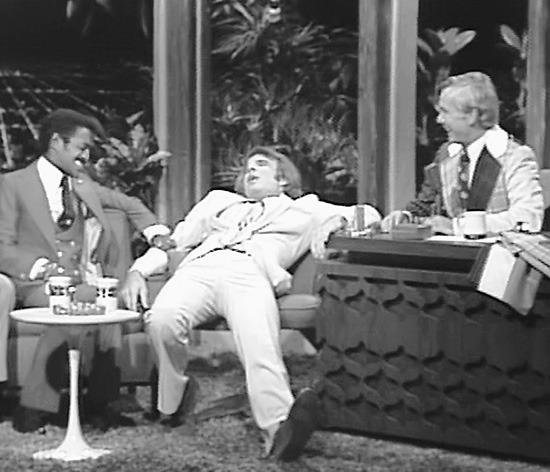
On The Tonight Show with Johnny and Sammy.
“Are you that boy who was on The Tonight Show last night?”
“Yes,” I said.
“Yuck!” she blurted out.